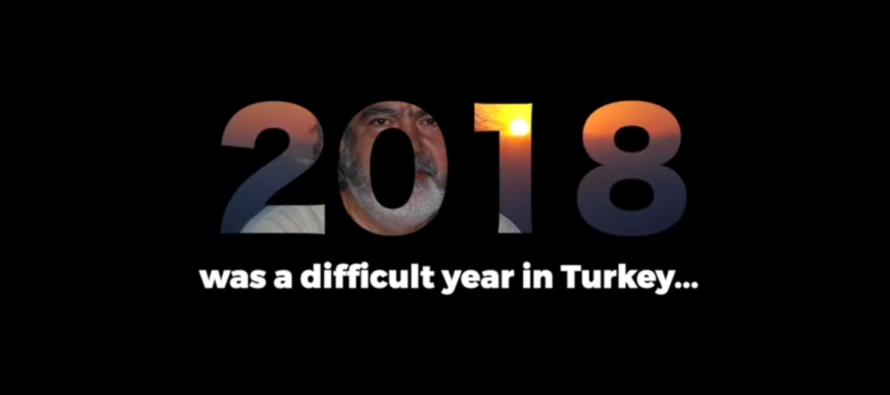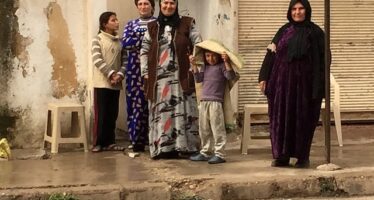“A Difficult Year in Turkey”? You’re tellin’ me…

![]()
Joining Human Rights Watch in their damning critique of the state of human rights in present day Turkey, the London-based International Observatory of Human Rights (established in 2017 as an independent non-profit NGO) have added to the long list of the country’s human rights violations in their recent 2018 in Review: Human Rights Violations in Turkey #TurkeyHumanRights.
And who, you might ask, suffers under this burden where the right of every human being to be treated with respect and dignity and free from state violence is denied – ? – only in Turkey’s case right now, it seems to be easier to ask: who isn’t..?
…in a country that by now seems to hold any individual rights or democratic norms to be the exception and amidst its nationalist, anti-Kurdish, fundamentalist and authoritarian rhetoric that is increasingly being used to keep civil society and the state together, dark deeds are being perpetrated with growing impunity and an open contempt for notions such as justice or respect.
The list of those who fail to be treated within the bounds of democratic norms and respect for human rights is a long one, according to the Observatory:
And so, they tell us, 2018 was a difficult year for…
…Kurds
…all opposition parties
…civil society
…women
…children
…prisoners
…anybody who had any kind of link to the Gulen Movement
…workers
…social media activists
…those who wanted to criticise the President of the country as they see fit
…academics
…journalists
…artists
…books and booklovers
with the conclusion that: 2019 will be a difficult year in Turkey.
No doubt about it.
The details are depressing to say the least:
As well as an ongoing militarised campaign against the Kurds both in south-east Turkey (Northern Kurdistan) and in northern Syria (Rojava), Kurdish people saw their elected deputies harassed, arrested, held in detention and jailed on an ongoing basis. Likewise cities with large Kurdish communities were once again, following the military operations of 2015-2016, under continuous curfew.
“The city of Diyarbakir alone has imposed curfews 332 times in the last three years…”
There is no doubt now that the current AKP-MHP regime sees all opposition as a threat and while the Kurds were the first to suffer with the removal of elected Kurdish mayors from their positions in 2017, by early 2018, “it began to do the same to mayors from the Republican People’s Party CHP.”
Attacks on civil society during the year are probably too many to be counted. Some examples might suffice to raise the hair on the back of your liberal neck. Some of the documented violations include:
The statement titled “War is a public health problem” from the Turkish Medical Association was enough for the Association to be declared “traitors” and for eleven academics and members of the central council of the Association to be detained.
Add to this a ban on “any kind of march, press meeting, meeting, tent building, stand opening and similar type activities”, such as International Women’s Day. “These bans were declared either locally or nationally and for periods from ten days up to one month.” Some of the victims were, as already mentioned, March 8 International Women’s Day as well as the Newroz celebrations on March 21, May 1 Workers’ Day and the Pride Parades of the LGBTI+ organisations planned for June last year.
The weekly meetings of the Saturday Mothers at the Galatasaray Square (searching for their disappeared relatives since 1995) was another of the activities repressed during§ §§ § 2018.
The list goes on and on: “According to the monthly human rights violations’ reports prepared by CHP deputy Sezgin Tanrikulu, during September and October 2018 alone, 26 events were banned, 125 events were intervened by police and at least 1,165 people were detained during these interventions nationwide.”
As for women:
“It has never been easy to be woman in Turkey. But in 2018, women suffered even more, particularly when their grievances overlapped with other causes.”
The number of women killed by men grew from its already high number of 347 in 2017 to 363 by the end of November 2018 (figures from the We Will Stop Femicide Platform). “In a significant share of these femicides, the police were reportedly indifferent to the demands of the women for protection.”
The Confederation of Public Employees’ Trade Unions (KESK) on International Working Women’s Day in March 2018, released the numbers of public employees sacked from their positions because of the State of Emergency Decrees (KHK): 21,409 were women. Of the removed academics: 1,409 were women.
Likewise: 16 women journalists, 35 women mayors and five women deputies were arrested.
For children in Turkey
61 children were killed and 1,014 children were subjected to sexual abuse during the first ten months of 2018. Also “…official statistics provided by the Presidency reveals that during the 18 months between January 2017 and June 2018, 21,957 children were pregnant in Turkey. And this was only the recorded, official figure. At the same period, 1 185 000 children under 18 were part of the workforce in Turkey.”
The number of children under six years of age staying in prisons together with their mothers grew from 624 in 2017 to 743, as of 14 November 2018.
“Teacher Ayşe Çelik, who said “Let no children die!”, on the Beyaz Show talk-show program in 2015 and asked for an end to the operations in south-eastern Turkey with those words entered Diyarbakir E Type Prison to serve her 1 year 3 months sentence together with her six months baby.”
Being a prisoner in Turkey
By the end of last year there were 259,327 people behind bars prisoner in Turkey.
It is probably unkind to mention the 1978 film Midnight Express (directed by Alan Parker, and based on Billy Hayes’ 1977 non-fiction book Midnight Express) but whether you were a child or an adult imprisoned by the state in Turkey, you were very liable to become a victim of: “psychological pressure, sexual violence, maltreatment, torture, denial of access to the right to health, imposed nudity searches, forced handcuffed treatments at hospitals and bans on books, magazines and newspapers…”
Other issues for prisoners in 2018 reported by the Human Rights Association (IHD), were: “the denial of access to health, physical violence, forced body searches, transfers of inmates who attempt to protest, carry out hunger strikes or resisting counting while standing to other prisons against their will or consent, the delay of release through disciplinary fines, the failure to deliver books and letters, restrictions on rights to sports and fixing cameras throughout the facilities including toilet cabins.”
Degrading prison uniforms also became an issue during the year: “…the monocoloured prisoner uniform policy that was legalised by one of the State of Emergency Decrees late in 2017. President Erdogan was referring to the Guantanamo prisoners’ uniforms as a source of legitimacy and was stressing the colour of the uniforms as “darker than the kernel of an almond”, a clear hint to the colour of human excreta.”
Overcrowding is also an ongoing issue in Turkey, not surprising, “as of 14 November 2018, there were 259,327 prisoners living in prisons with a maximum capacity of 211,766. The number of inmates continues to increase daily. This means, about 50,000 prisoners entered 2019 sleeping on the cold floors of prisons.”
Torture and other forms of maltreatment were also reported by the Human Rights Association (IHD) and the Turkey Human Rights Foundation (TIHV): “538 applications were made to TIHV in the first eleven months of 2018 on claims of being subjected to torture or other forms of maltreatment. IHD’s data suggests that, in the same period, 2,719 inmates were subjected to some form of torture or maltreatment, 284 of these being beaten during detention and 175 beaten outside of detention. Another 2,260 cases took place during interventions of security forces to meetings and protests.”
Finally, though not in a Turkish prison, 2,535 individuals began 2019 with electronic tags at their ankles.
“Gulenist paranoia”
In 2018 according to TurkeyPurge.com, “an average of 450 people with alleged links to the Gulen Movement were detained every week… Prosecutors found that subscription to a newspaper published by the Gulenists, having a bank account with their bank Bank Asya, the use of Bylock as enough evidence for proof of being a Gulenist. By November 2018, the number of detained, alleged Gulenists grew to 217,971, of which 82,142 were arrested.”
The coup, as most people outside Turkey can see now, has become a pretext to attack and prevent any criticism of Turkish President and Chairman of the ruling Justice and Development Party, Recep Tayyip Erdoğan…
Erdoğan himself was quoted as saying that the failed coup of 15 July 2016 was a “gift from God”, “giving him the chance to re-shape the country, and purge the country’s elite from enemies, who accuse him of creeping Islamisation in the traditionally secular state.”
2018 was a difficult year for workers…
“For workers, 2018 was worse than ever before. Both the economic crisis and neo-liberal policies diminishing workers’ rights, coupled with a government that regarded any form of strike as an intervention attempt of international powers, embittered the conditions of the workers. Time and again, workers and members of labour unions using their rights to strike were detained with allegations of membership of terrorist organisations or of furthering their propaganda.”
…A difficult year for social media activists
“A majority of the over 20,000 court cases initiated in 2017 with charges of insulting the president of the country concerned social media messages. On orders from Minister of Interior Suleyman Soylu, the police department’s cybercrimes section has formed a special social media screening unit in 2018 and Turkey has outpaced the whole of Europe in the number of social media accounts investigated.”
When Turkey invaded Afrin, in the Democratic Federation of Northern Syria, just one year ago now, this situation became even more pronounced… “one month after the start of the Afrin Operation on 20 January 2018, 845 people were detained because of their social media messages. Of these, 127 were arrested.”
Figures given by the Security General Directorate (the police), “seemingly with great pride”:
110,000 social media accounts were investigated in 2018,
7,109 of the users were detained and
2,754 were arrested.
Around 2,828 were released with judicial control restrictions, “which meant they were in grave trouble with the crippled Turkish judicial system.”
As for Twitter: “…while Turkey asked for the suspension of 5,823 accounts in 2017, in the first six months of 2018 this figure was 8,480. This large number meant that Turkey accounted for 73 per cent of Twitter’s suspension requests. Russia came second, having filed 1,585 suspension requests in the first six months of 2018.”
Insulting the President @ 80,000 insults?
“Turkey’s President Recep Tayyip Erdoğan appears to be the most insulted man in the world. The evidence is the over 80,000 people investigated on charges of insulting the president. In 2017 alone, 6,033 people were sued for having insulted the president. By now, over 3,500 have received prison sentences. While the execution of 2,550 of these decisions were delayed, their sentences means that if they commit a crime of similar nature within five years, these will be revived.”
In addition:
“Whereas the standard punishment for insult cases was eleven months and 20 days of jail prior to 24 June, in October 2018, 78 years old Ali Ergun Guran was given seven years for having insulted the president on social media. Erdogan’s lawyers sued the chairman of the main opposition party for damages worth one million Turkish Lira after he retweeted a cartoon that allegedly contained material insulting Erdogan.”
Academics
“Tens of academics allegedly linked to the Gulen Movement were dismissed from their universities, arrested and, on charges of being members of a terrorist organisation, sentenced to prison ranging from six years and three months to up to 15 years in 2018. They were not only imprisoned, but had their academic titles removed as well. Their books in public libraries were destroyed; their MA and PhD theses were erased from the digital thesis banks and articles they had written were deleted from online encyclopaedias.”
As for the 2,212 Peace Academics who signed the “We won’t participate in this crime” petition against state violence in southeast Turkey, 115 of them had already been dismissed by the AKP government in 2017. Since then the Turkish state continues to take action against these people who called for a suspension of the violent assault against civilian communities in northern Kurdistan.
In addition Frontline Defenders tells us:
“Between 17 December 2018 to 24 January 2019, prison sentences were handed down to 28 academics who had signed the peace petition drafted by Academics for Peace in January 2016. They were all sentenced on charges of creating “terrorist propaganda”. Twenty-five academics received suspended sentences of one year and three months, but the sentences of three academics, including Dr. Yonca Demir and Prof. Şebnem Korur Fincancı, were not suspended. They received prison sentences of between two years and one month, and three years.”
International Observatory of Human Rights:
“…a total of 542 academics were sued on accusations of “making propaganda of terrorist organisation”. By the end of the year, 61 of them were found guilty and most were sentenced to one year and three months in prison… The sentence was doubled for the president of the Turkey Human Rights Foundation (TIHV) and human rights defender Prof. Dr. Şebnem Korur Fincancıby judges under the control of the government.”
2018 was also a difficult year for journalists
“Seeing that its ranking could not be worse, the government continued to arrest journalists, monopolise the press and punish the opposition media throughout 2018.”
The list of individual journalists targeted by the Turkish state would be being too long to include, not alone journalists harassed, detained, held, arrested, but also newspapers closed, press cards withdrawn (an average of two per day, “thus reaching 1,954 by mid-December since the thwarted coup of 2016”), and life sentences handed out in the politically controlled courts to those tasked with keeping the public informed.
For example:
“…a Turkish court made February 13 the darkest day of Turkish journalism. Nazli Ilicak, Ahmet Altan, Mehmet Altan, Fevzi Yazici and Yakup Simsek were all sentenced to life imprisonment for their journalistic work, which, the prosecutor claimed, contained subliminal messages. On February 28, another court added insult over injury and sentenced Ahmet Altan to two years and eleven months for having insulted the president.” More depressingly (but not surprisingly) “the regional court of appeals approved the sentence on October 2”.
…So much so that Amnesty said during the year: “For journalists, Turkey has become a dungeon”…
The cover page for Turkey Purge puts the number at 319 journalists eventually arrested in 2018… the Stockholm Centre for Freedom, puts the figure (for media workers) at 242.
Wikipedia produces a list of arrested journalists in Turkey. The list might need to be updated on a daily basis.
The Committee to Protect Journalists (CPJ) said in December: “Even as Turkish President Recep Tayyip Erdoğan has been the fiercest critic of Saudi Arabia for the murder of Khashoggi, his government continued to jail more journalists than any other on the planet.”
Other examples showing that the Turkey of President Erdoğan is not the place to be investigating or reporting news:
On the 5 January journalist Ayşenur Arslan was sentenced to eleven months and 20 days in prison accused of “insulting the president”.
On January 16, journalists who stepped in to serve as substitute editors at the Ozgur Gundem Daily “in a show of solidarity were sentenced to prison.”
On January 23, journalist Seda Taskin was arrested when the court decided that the khaki dress she wore amounted to terrorist propaganda.
On January 24, author Hamide Yigit was sentenced on charges of insulting the president.
11 September 2018, Austrian journalist Max Zirngast was detained due to his articles about Turkey and a book he wrote about Kobane, the Kurdish city in northern Syria. He was released on 24 December 2018, but remains barred from leaving the country.
14 November 2018, former Zaman Daily columnist Ali Ünal was sentenced to 19 years and 6 months in prison for being the founder and manager of a terrorist organisation.
On December 18, Hamza Gündüz, Hakkari correspondent for the Mesopotamia Agency, was sentenced to one year and eight months in prison for allegedly spreading terrorist organisation propaganda on social media.
December 17, President Erdogan threatened Fox TV anchor Fatih Portakal, who advocated for people to use their right to protest like the Yellow Jackets in France with these words: “Know your limits! If you don’t know your limits, this people will blow your neck.”
Finally, not getting the joke, on the 11 of January 2018, “15 internet sites which broadcasted Brazilian cartoonist Carlos Latuff’s Erdogan cartoon faced partial bans.”
2018 was a difficult year for artists and for book readers…
As the great, as well as persecuted Turkish poet Nâzım Hikmet would well understand:
“Turkey’s Erdogan has always accused artists and intellectuals of being “strangers to the values of the Turkish people.” Since the Gezi Park events, these “strangers” were also “pawns” of foreign powers trying to topple the AKP government. The first artist to suffer from this negative outlook in 2018 was Abdullah Ayav, soloist of Koma Denge Amara group. The court decided that Ayav’s songs amounted to propaganda of a terrorist organisation. In April, Dilan Ekin of Grup Yorum and in May, artist Erdal Guney suffered the same court ruling.”
The President also took offence at other artists who were foolish not to humour his sensitive soul:
Singer Zuhal Olcay was sentenced to ten months in jail in March 2018 for having insulted the president. “A higher court reversed the judgment and decided that the punishment should have been longer”
In April, artist Mehmet Suavi and in May, Erdal Guney were sentenced to eleven months and 20 days in jail, also for having insulted the president.
“Theatre and TV soap opera actor Baris Atay was on Erdogan’s radar as he supported the Gezi Park Events. On May 16, he was detained for his social media messages. On December 5, an arrest warrant regarding his colleague Memed Ali Alabora was issued. Atay escaped sentencing by becoming a parliamentarian in the June 24 election and Alabora by resettling in the United Kingdom.”
Artists and booklovers also feel victim with plays not being allocated theatres to be staged, programmes cancelled and artists critical of the regime detained and arrested.
Likewise “tens of publication houses were closed after the coup attempt 2016, their publications were also banned automatically, regardless of their content. “
Many books were also banned, the most famous being Aliza Marcus’s Blood and Belief: The PKK and the Kurdish Fight for Independence which was published by Iletisim Publications in 2009, Faysal Dağlı’s Birakuji (Civil War of the Kurds) published by Belge Publications in 1994 and Fehim Taştekin’s Rojawa (The Time of the Kurds) published by Iletisim Publications in 2016 as well as Aytekin Gezici’s History of the Kurds published by Tutku Publications in 2013.
In addition: “Kurdish prisoners were not given books on the history and culture of the Kurds. Selahattin Demirtas’s best-selling book Seher was banned in most prisons. When prisoners asked for published Kurdish books that were not banned, prison authorities asked them to pay for the cost of translating them so the content of the books could be inspected… At Diyarbakir prison, prisoners were denied books like Robinson Crusoe, The Little Prince and even Ali Baba and the Forty Thieves….”
“It was a very good year
It was a very good year for small town girls
And soft summer nights
We’d hide from the lights
On the village green” …Frank Sinatra sang.
…Not so for Turkey and its people, especially those with the courage to speak out or those with a belief in democracy.
Instead, the conclusion coming close to a mantra now: 2019 will be a difficult year in Turkey.
“2019 will be a difficult year in Turkey…”
No doubt about it.
Read the rest of the details in the Report* here:
https://observatoryihr.org/2018-in-review-human-rights-violations-in-turkey/
séamas carraher
Image
2018 in Review: Human Rights Violations in Turkey #TurkeyHumanRights
(Screenshot – fair use Fair use)
* “This Almanac of Human Rights Violations in Turkey in 2018 was prepared largely by information taken from Turkish Human Rights Foundation’s (TIHV) daily report of human rights violations in Turkey (http://tihv.org.tr/category/gunluk-insan-haklari-raporlari/), Human Rights Foundation’s (IHD) occasional reports (http://www.ihd.org.tr/category/c86-raporlar/c34-el-raporlar/), weekly human rights violations reports published by CHP deputy Şenal Sarıhan, and monthly reports published by her colleague Sezgin Tanrıkulu.” (International Observatory of Human Rights)
Related Articles
Uncertain Times in Rojava – The Autonomous Administration of North and East Syria
![]()
What is the future for the democratic revolution trying to unfold in North and East Syria?
Not scared to fight: Why I left Russia for the ecological struggle in Rojava
![]()
My interest in Rojava and Kurdistan ignited after a long time spent searching for a similar model or concept inside the Russian movement
Women, the Church & the Irish State: A history of misogyny & repression
![]()
The power of the Catholic Church in Ireland was cemented even before the founding of the Irish Free State in 1922





